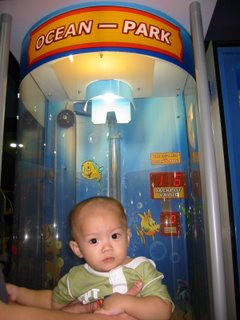Duncan starts walking!
It was early in the morning and then he just did it. He went to his Mama with rushing legs. Well, steps 1 - 4 is quite ok for the meantime.
Practice makes perfect. That night, he proudly showed his daddy that he can make step 1-2-3-4!
Monday, August 28, 2006
Saturday, August 26, 2006
Monday, August 21, 2006
Guidelines on how to use a slide
Location: Sm Hypermarket - Ugong
Time : approx 2:30pm

Let your mommy help you to position on the top of the slide.

Help you some more...

Until you can balance yourself.

Hang-on for dear life.

And never easily let go.

Until you're ready.

To shout... yeeee haaaaaaaa!

And then you realized.... you did it!
Saturday, August 19, 2006
Juz Got Lucky!

While waiting for Daddy, Duncan and Mommy went to Quantum @ V-mall. Enjoyed the rides here and there until we got to the Ocean Park Game. On the start of the game you will push the lighted button that will drop a ball into a hole. Each hole as a number of tickets to be won where you can change at the counter for a corresponding price. For a starter... D's got lucky. One token, for his pushing the button gives us 50 tickets = a coloring pencil.
Not bad Duncan! Till we get the Jackpot!
Sunday, August 06, 2006
Saturday, August 05, 2006
CHICKENPOX VACCINE!
Special Instruction:
Paracetamol drops 1.2ml every 4 hours for temperature 37.8and above
Paracetamol drops 1.2ml every 4 hours for temperature 37.8and above
Tuesday, August 01, 2006
Chickenpox Vaccine - What you need to know.
Why get vaccinated?
Chickenpox (also called varicella) is a common childhood disease. It is usually mild, but it can be
serious, especially in young infants and adults.
• The chickenpox virus can be spread from person to person through the air, or by contact with fluid from chickenpox blisters.
• It causes a rash, itching, fever, and tiredness.
• It can lead to severe skin infection, scars, pneumonia, brain damage, or death.
• A person who has had chickenpox can get a painful rash called shingles years later.
Chickenpox vaccine can prevent chickenpox.
Most people who get chickenpox vaccine will not get chickenpox. But if someone who has been
vaccinated does get chickenpox, it is usually very mild. They will have fewer spots, are less likely to have a fever, and will recover faster.
Who should get chickenpox vaccine and when?
Children should get 1 dose of chickenpox vaccine between 12 and 18 months of age,
or at any age after that if they have never had chickenpox.
• People should not get chickenpox vaccine if they have ever had a life-threatening allergic reaction to gelatin, the antibiotic neomycin, or (for those needing a second dose) a previous dose of chickenpox vaccine.
• People who are moderately or severely ill at the time the shot is scheduled should usually wait until they recover before getting chickenpox vaccine.
• Pregnant women should wait to get chickenpox vaccine until after they have given birth. Women should not get pregnant for 1 month after getting chickenpox vaccine.
• Some people should check with their doctor about whether they should get chickenpox vaccine,
including anyone who:
- Has HIV/AIDS or another disease that affects the immune system
- Is being treated with drugs that affect the immune system, such as steroids, for 2 weeks or
longer
- Has any kind of cancer
- Is taking cancer treatment with x-rays or drugs
• People who recently had a transfusion or were given other blood products should ask their
doctor when they may get chickenpox vaccine.
People who do not get the vaccine until 13 years of age or older should get 2 doses, 4-8 weeks
apart.
Chickenpox vaccine may be given at the same time as other vaccines.
What are the risks from chickenpox vaccine?
A vaccine, like any medicine, is capable of causing serious problems, such as severe allergic reactions. The risk of chickenpox vaccine causing serious harm, or death, is extremely small.
Getting chickenpox vaccine is much safer than getting chickenpox disease. Most people who get chickenpox vaccine do not have any problems with it.
Mild Problems
• Soreness or swelling where the shot was given (about 1 out of 5 children and up to 1 out of 3
adolescents and adults)
• Fever (1 person out of 10, or less)
• Mild rash, up to a month after vaccination (1 person out of 20, or less). It is possible for these
people to infect other members of their household, but this is extremely rare.
Moderate Problems
• Seizure (jerking or staring) caused by fever (less than 1 person out of 1,000).
Severe Problems
• Pneumonia (very rare)
Other serious problems, including severe brain reactions and low blood count, have been reported after chickenpox vaccination. These happen so rarely experts cannot tell whether they are caused by the vaccine or not. If they are, it is extremely rare.
Chickenpox (also called varicella) is a common childhood disease. It is usually mild, but it can be
serious, especially in young infants and adults.
• The chickenpox virus can be spread from person to person through the air, or by contact with fluid from chickenpox blisters.
• It causes a rash, itching, fever, and tiredness.
• It can lead to severe skin infection, scars, pneumonia, brain damage, or death.
• A person who has had chickenpox can get a painful rash called shingles years later.
Chickenpox vaccine can prevent chickenpox.
Most people who get chickenpox vaccine will not get chickenpox. But if someone who has been
vaccinated does get chickenpox, it is usually very mild. They will have fewer spots, are less likely to have a fever, and will recover faster.
Who should get chickenpox vaccine and when?
Children should get 1 dose of chickenpox vaccine between 12 and 18 months of age,
or at any age after that if they have never had chickenpox.
• People should not get chickenpox vaccine if they have ever had a life-threatening allergic reaction to gelatin, the antibiotic neomycin, or (for those needing a second dose) a previous dose of chickenpox vaccine.
• People who are moderately or severely ill at the time the shot is scheduled should usually wait until they recover before getting chickenpox vaccine.
• Pregnant women should wait to get chickenpox vaccine until after they have given birth. Women should not get pregnant for 1 month after getting chickenpox vaccine.
• Some people should check with their doctor about whether they should get chickenpox vaccine,
including anyone who:
- Has HIV/AIDS or another disease that affects the immune system
- Is being treated with drugs that affect the immune system, such as steroids, for 2 weeks or
longer
- Has any kind of cancer
- Is taking cancer treatment with x-rays or drugs
• People who recently had a transfusion or were given other blood products should ask their
doctor when they may get chickenpox vaccine.
People who do not get the vaccine until 13 years of age or older should get 2 doses, 4-8 weeks
apart.
Chickenpox vaccine may be given at the same time as other vaccines.
What are the risks from chickenpox vaccine?
A vaccine, like any medicine, is capable of causing serious problems, such as severe allergic reactions. The risk of chickenpox vaccine causing serious harm, or death, is extremely small.
Getting chickenpox vaccine is much safer than getting chickenpox disease. Most people who get chickenpox vaccine do not have any problems with it.
Mild Problems
• Soreness or swelling where the shot was given (about 1 out of 5 children and up to 1 out of 3
adolescents and adults)
• Fever (1 person out of 10, or less)
• Mild rash, up to a month after vaccination (1 person out of 20, or less). It is possible for these
people to infect other members of their household, but this is extremely rare.
Moderate Problems
• Seizure (jerking or staring) caused by fever (less than 1 person out of 1,000).
Severe Problems
• Pneumonia (very rare)
Other serious problems, including severe brain reactions and low blood count, have been reported after chickenpox vaccination. These happen so rarely experts cannot tell whether they are caused by the vaccine or not. If they are, it is extremely rare.
Subscribe to:
Comments (Atom)






